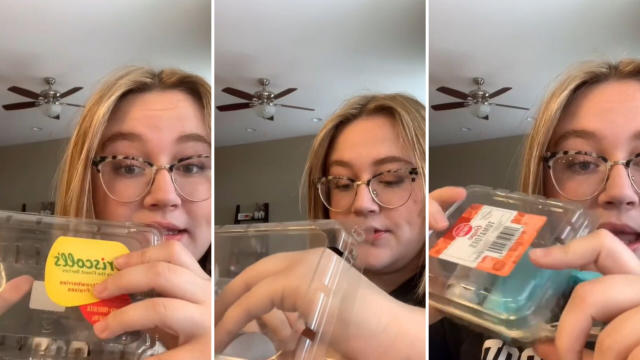On this website, some posts contain affiliate links, which means that if you buy a product using my link, I may earn a commission.
Banish the Bins: Genius Hacks for Reducing Food Waste And Saving Money teaches you how to reduce food waste and save money with clever tips and tricks. By implementing these strategies, you can minimize your grocery expenses while also minimizing the amount of food that goes to waste.
This article will explore various methods such as buying only the necessary quantities, reusing leftovers, and properly storing food to extend its freshness. Additionally, you’ll discover ways to keep your food waste bin clean and odor-free. Don’t miss out on these genius hacks that will save you money and help the environment by reducing food waste.

Credit: www.yahoo.com
Why Should We Care About Food Waste?
Discover the importance of reducing food waste and saving money with “Banish the Bins: Genius Hacks for Reducing Food Waste And Saving Money. ” Learn how to prevent wastage, reuse leftovers, and make the most of your food to make a positive impact on the environment and your wallet.
Environmental Impact Of Food Waste
Food waste has a significant environmental impact that cannot be ignored. When food is wasted, it ends up in landfills where it decomposes and produces methane gas. Methane gas is a greenhouse gas that contributes to climate change, making food waste a major contributor to global warming. In fact, food waste is estimated to be responsible for 6-7% of total greenhouse gas emissions worldwide. By reducing food waste, we can help mitigate climate change and preserve the planet for future generations.
Economic Impact Of Food Waste
The economic impact of food waste is staggering. According to a report by the United Nations, the annual cost of food waste globally is around $1 trillion. This includes the cost of producing, processing, transporting, and disposing of wasted food. Food waste not only puts a strain on the economy, but it also exacerbates issues of hunger and poverty. By reducing food waste, we can save money at both the individual and societal levels, and redirect these resources towards more productive and sustainable initiatives.
Ethical Implications Of Food Waste
Food waste raises ethical concerns as well. While millions of people around the world go hungry, perfectly good food is being thrown away. The Food and Agriculture Organization of the United Nations estimates that about one-third of all food produced for human consumption is lost or wasted. This means that we are wasting valuable resources such as water, energy, and labor that went into producing the food. By reducing food waste, we can ensure that everyone has access to the food they need, and work towards a more equitable and just society.
Money-saving Kitchen Hacks To Reduce Food Waste
Discover genius hacks to reduce food waste in your kitchen and save money. Learn simple tips like buying only what you need, reusing leftovers to create new recipes, and keeping your food fresh for longer. Say goodbye to unnecessary waste and hello to a budget-friendly, eco-friendly kitchen.
How To Properly Store Fruits And Vegetables
One of the key ways to reduce food waste and save money in the kitchen is by properly storing fruits and vegetables. By following these simple tips, you can extend the shelf life of your produce and minimize spoilage.Keep fruits and vegetables separate
When storing fruits and vegetables together, the ethylene gas released by the fruits can cause the vegetables to spoil faster. To prevent this, store them separately in the refrigerator or in different compartments.Use the crisper drawer
The crisper drawer of your refrigerator is designed to help maintain the humidity levels needed for optimal storage of fruits and vegetables. Store leafy greens and vegetables in one drawer and fruits in another to maximize freshness and prevent cross-contamination.Wrap herbs in a damp paper towel
To keep herbs fresh longer, wrap them in a damp paper towel and store them in a resealable bag or container in the refrigerator. This helps maintain their moisture and prevents them from wilting and drying out.Store potatoes and onions separately
Potatoes and onions release gases that can cause each other to spoil faster. To keep them fresh, store them separately in a cool, dry place. You can also store them in breathable bags or baskets to allow for better air circulation.Utilizing Leftovers In Creative Ways
Leftovers can often go to waste if not properly utilized. Instead of throwing them away, try these creative ways to give your leftovers a delicious makeover.Create a leftover stir-fry
Transform leftover veggies, proteins, and grains into a tasty stir-fry. Simply sauté them together in a pan with some oil and your choice of seasonings or sauces for a quick and flavorful meal.Make a hearty soup or stew
Leftover roasted chicken, vegetables, and grains can be combined to make a comforting soup or stew. Just add some broth, herbs, and spices, and let it simmer until all the flavors meld together.Repurpose leftovers into wraps or sandwiches
Turn last night’s leftovers into a delicious wrap or sandwich filling. Use tortillas or bread as a base and layer on your leftovers along with some fresh greens or condiments for a quick and satisfying meal.Freeze leftovers for future meals
If you can’t consume your leftovers right away, freeze them in individual portions for future meals. This way, you’ll always have a convenient and budget-friendly option on hand for busy days.Understanding Expiration Dates And Food Safety Guidelines
To prevent unnecessary food waste and ensure food safety, it’s important to understand expiration dates and follow food safety guidelines.Know the difference between “best before” and “use by” dates
“Best before” dates indicate when a product is at its best quality, but it doesn’t necessarily mean it’s unsafe to consume after that date. “Use by” dates, on the other hand, indicate when a product should be consumed for safety reasons. Use your judgment and rely on your senses to determine if a food is still fresh and safe to eat.Practice proper storage and handling
Store perishable foods like meat, dairy, and leftovers in the refrigerator at or below 40°F (4°C). Keep raw and cooked foods separate, wash your hands before and after handling food, and sanitize cutting boards and utensils to prevent cross-contamination.Donate surplus food
If you find yourself with excess food that you won’t be able to consume before it spoils, consider donating it to local food banks or shelters. Not only will you be reducing food waste, but you’ll also be helping those in need. By following these money-saving kitchen hacks to reduce food waste, you can not only save money but also contribute to a more sustainable and environmentally friendly lifestyle. Start implementing these tips in your daily routine and make a positive impact on both your wallet and the planet.Strategies To Prevent Food Waste At Home
Reducing food waste not only helps the environment but also saves you money. By implementing simple strategies in your home, you can minimize food waste and make the most out of your groceries. Here are three effective strategies to prevent food waste at home:
Buying Food Items In The Right Quantities
One of the main reasons for food waste at home is buying more than what is necessary. To avoid this, it is important to plan your meals in advance and create a shopping list based on the required quantities of ingredients. Consider your family’s eating habits and portion sizes to determine how much food you actually need. By following a shopping list and sticking to it, you can reduce unnecessary purchases and prevent food from going to waste.
Repurposing Leftovers Into New Recipes
Leftovers are often the culprit behind food waste. Instead of letting them go to waste, get creative and repurpose them into new and exciting recipes. For example, leftover vegetables can be turned into a delicious stir-fry or soup, and leftover chicken can be used to make a flavorful sandwich or salad. Not only does this strategy prevent food waste, but it also adds variety to your meals and saves you money by utilizing ingredients you already have.
Monitoring Appetite And Portion Sizes
Being mindful of appetite and portion sizes is crucial in preventing food waste. Serve smaller portions initially and encourage family members to take seconds if they are still hungry. By doing so, you can avoid overestimating the amount of food needed and prevent leftovers from being tossed. Additionally, practicing mindful eating can help you listen to your body’s hunger and fullness cues, ensuring that you serve the right amount of food each time.


Credit: www.theguardian.com


Credit: in.pinterest.com
Frequently Asked Questions Of Banish The Bins: Genius Hacks For Reducing Food Waste And Saving Money
How Can Reducing Food Waste Save Money?
Reducing food waste saves money by buying only what you need, avoiding unnecessary cooking, storing leftovers, reusing them for new recipes, and being mindful of portion sizes.
What Are 5 Ways To Reduce Food Waste?
To reduce food waste, follow these five simple hacks: 1. Buy only what you need. 2. Avoid unnecessary cooking. 3. Store leftovers in the fridge. 4. Repurpose leftovers for new recipes. 5. Serve appropriate portions to avoid excess. These strategies will help save money and minimize food wastage.
What Is A Strategy To Reduce Food Loss And Waste?
A strategy to reduce food loss and waste is to save and eat leftovers safely. If you can’t eat them within three days, store them in the freezer and label them. It’s also important to keep your freezer organized to avoid food getting lost and thrown out due to freezer burn.
How Do I Keep My Food Waste Bin Clean?
To keep your food waste bin clean, store it away from direct sunlight to slow decomposition and reduce odors. After washing with boiling water and bleach, spray it with disinfectant. Smear the bin lid with an environmentally friendly oil like citronella, tea tree oil, or eucalyptus.
Source: Wigan Council.
Conclusion
Reducing food waste and saving money in the kitchen doesn’t have to be complicated. With these genius hacks, you can easily make a difference. From meal planning and proper storage techniques to reusing leftovers and composting, there are so many ways to banish the bins and minimize your impact on the environment.
By being mindful of your food consumption and implementing these tips, you’ll not only save money but also contribute to a more sustainable future. Start incorporating these strategies into your routine today and make a positive change for yourself and the planet.
On this website, some posts contain affiliate links, which means that if you buy a product using my link, I may earn a commission.

